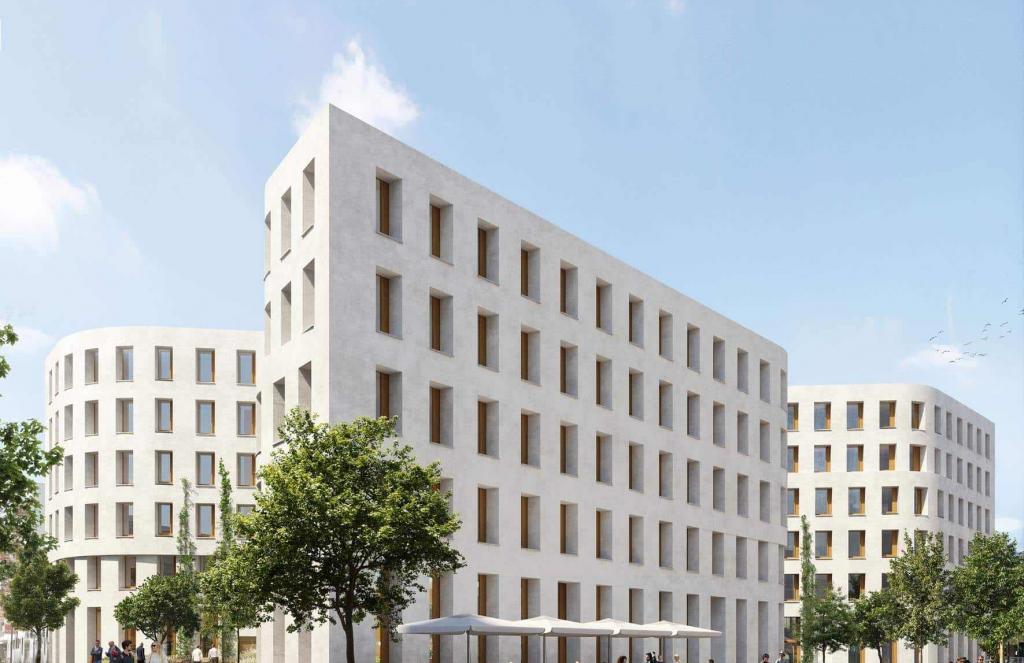Thessaloniki gets ready for its metro launch in November
The underground rapid transit lines have been under construction for almost two decades due to various project delays
 TheMayor.EU logo
TheMayor.EU logo 
The new complex will have 80-centimetre thick brick walls, Source: Patricia Bagienski-Grandits via Soravia
The buildings are designed in such a way that they will not require a heating system, maintaining a constant temperature
Yesterday, the Soravia real estate group started constructing a cutting-edge sustainable office complex in Vienna’s innovative Seestadt Aspern district. The three-structure complex named ‘Robin’ will not require a heating system as it will maintain a constant temperature of 22 degrees Celsius.
The project is set to complete in 2024 and will have 7,000 square metres of office space in the district, with room for 300 jobs. The buildings will not need any energy for heating, earning it a Gold Certificate from the Austrian Society for Sustainable Buildings.
The main idea for heating the Robin complex is to use and retain human body heat, as well as the energy emitted by electrical devices. According to a statement by the developer, this will happen through the buildings’ 80-centimetre-thick brick walls and triple-glazed windows making for extreme levels of energy retention.
Furthermore, people will be the main source of energy, as a single human body emits around 80 to 90 watts of energy, while electrical devices like lamps and commuters also emit heat. According to the developer, this would lead to a constant temperature of 22 to 26 degrees. However, the buildings will have a cooling system, that is supposed to be in use during peak summer heat days. Yet, the cooling system is integrated into the Robin structure in a way that will use minimal energy.
Because of the buildings’ sturdy structure of thick bricks and relative technological simplicity, it offers a lot when it comes to long-term durability and sustainability. According to the developer, it would also be around 30% cheaper in its entire life cycle, compared to conventional buildings.
At the same time, it solves one of the biggest problems the EU faces currently and will have to solve in the next 30-ish years. Around 51% of the energy consumption in the bloc goes towards heating and cooling. Solving that resource drain is one of the sustainable solutions cities will have to consider going forward.

The underground rapid transit lines have been under construction for almost two decades due to various project delays

Now you can get your wine in Talence by paying directly in Bitcoin

That’s because the state has to spend money on updating the railway infrastructure rather than subsidizing the cost of the popular pass

Rethinking renewable energy sources for the urban landscape

The examples, compiled by Beyond Fossil Fuels, can inform and inspire communities and entrepreneurs that still feel trepidation at the prospect of energy transition

Now you can get your wine in Talence by paying directly in Bitcoin

The 10th European Conference on Sustainable Cities and Towns (ESCT) sets the stage for stronger cooperation between the EU, national and local level to fast track Europe's transition to climate neutrality.

At least, that’s the promise made by the mayor of Paris, Anne Hidalgo

The underground rapid transit lines have been under construction for almost two decades due to various project delays

At least, that’s the promise made by the mayor of Paris, Anne Hidalgo

Hostal de Pinós is located in the geographical centre of the autonomous region

Despite its church-y name, the district has long been known as the hangout spot for the artsy crowds

Urban dwellers across the EU are having a say in making their surroundings friendlier to people and the environment.

Forests in the EU can help green the European construction industry and bolster a continent-wide push for architectural improvements.

Apply by 10 November and do your part for the transformation of European public spaces

An interview with the Mayor of a Polish city that seeks to reinvent itself

An interview with the newly elected ICLEI President and Mayor of Malmö

A conversation with the Mayor of Lisbon about the spirit and dimensions of innovation present in the Portuguese capital














